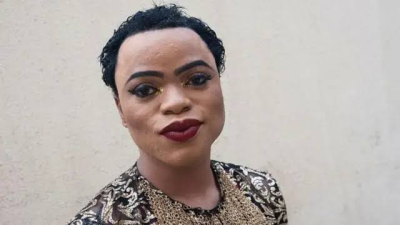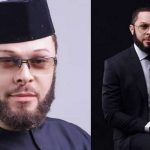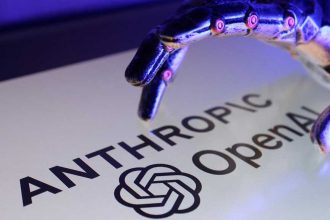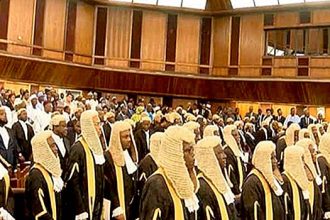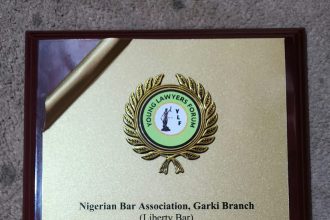Controversial crossdresser Idris Okuneye, popularly known as Bobrisky, may be facing new criminal charges after allegations surfaced that he served his jail term in a private apartment and bribed officials to drop charges against him. This development follows an investigative report from a panel initiated by the Minister of Interior, Olubunmi Tunji-Ojo, on September 30, 2024.
Background: Bobrisky’s Legal Troubles
Bobrisky was sentenced to six months’ imprisonment on April 12, 2024, for abusing the naira. He served his sentence at the Kirikiri Custodial Centre in Lagos before being released on August 5, 2024. However, shortly after his release, social media erupted with controversy following claims made by Martins Otse, known as VeryDarkMan, a social critic.
Otse shared a voice recording allegedly featuring Bobrisky boasting about bribing officers of the Economic and Financial Crimes Commission (EFCC) with N15 million to drop money laundering charges. The recording also included claims that Bobrisky had bribed officials of the Nigerian Correctional Service (NCoS) to serve his sentence in a private apartment instead of the designated prison facility.

Investigation and Report Findings
Following these allegations, Minister Tunji-Ojo commissioned a panel chaired by Magdalena Ajani, Permanent Secretary of the Ministry of Interior, to investigate the claims. The panel reviewed the circumstances surrounding Bob’s imprisonment and bribery claims.
In its report, which was exclusively obtained by Sunday Punch, the panel found no evidence to support the claim that Bobrisky served his sentence outside the Kirikiri Custodial Centre. However, the report highlighted that Bobrisky’s allegations had caused significant damage to the reputation of the correctional service, describing them as false and defamatory.
The panel recommended that Bobrisky should face defamation charges under Sections 373-375 of the Criminal Code Act for making unsubstantiated claims about receiving special treatment.
The report also recommended that the Department of State Services (DSS) investigate whether Bobrisky or his associates directly or indirectly bribed EFCC or NCoS officials. If the allegations of bribery are proven, the panel suggested that he should face charges under the Corrupt Practices and Other Related Offences Act.
Indictment of Correctional Officers
In addition to the findings related to Bobrisky, the panel’s report implicated four correctional officers in irregularities during Bobrisky’s imprisonment. These officers were recommended for disciplinary action in accordance with the NCoS’s service conditions and relevant civil service regulations.

Among those indicted was a former Controller of Corrections, Ben Rabbi-Freeman. The panel accused him of transferring Bobrisky between custodial centres without proper documentation and backdating the necessary forms. Similar allegations were made against other officials, including Michael Anugwa, a Deputy Controller of Corrections at the Kirikiri Medium Security Custodial Centre, who was faulted for receiving Bobrisky without the required documentation.
Recommendations for Correctional Reform
The panel also called for broader reforms within the correctional system, including an audit of all inmates in custodial centres, their warrants, and other records to ensure transparency. It suggested the establishment of mechanisms for continuous oversight of these facilities and urged the “decommercialization” of welfare services provided to inmates. This would ensure adequate funding and partnerships with civil society organisations for sustainable inmate support services.
The panel recommended that special facilities be created in correctional centres to cater to the diverse needs of prisoners, including those related to health, age, and gender identity.
Bobrisky: Human Rights Debate and Activists’ Response
The case has sparked a broader debate on the rights of crossdressers, transgender, and transsexual individuals within Nigeria’s legal and correctional systems. Some activists have called for the government to recognise the existence of such individuals and to adapt facilities accordingly.
Human rights activist Femi Adeyeye criticised the conditions at the Kirikiri Custodial Centre, arguing that it was not suitable for someone of Bobrisky’s orientation and urging the government to establish special cells for transgender persons.
Another activist, Michael Adaramoye, highlighted the need for Nigerian society to address the growing transgender population and advocated for facilities that accommodate such individuals. He also called for a complete overhaul of the correctional system, emphasising the importance of treating prisoners with dignity to enable positive character reform.
Toyin Taiwo-Ojo, a human rights lawyer, noted that the Nigerian government’s stance on homosexuality remains unclear. She argued that the Federal Government should reassess Bobrisky’s detention, taking into account the broader implications for human rights and the treatment of gender-diverse individuals.
Bobrisky: Special Facilities and VIP Treatment in Prisons
A Nigerian Correctional Service senior officer explained to Sunday Punch that custodial centres often provide different facilities based on inmates’ needs, including health conditions, gender, and age. The officer described these accommodations as “special facilities,” which are sometimes misunderstood as VIP treatment.
The officer clarified that Bobrisky’s separate accommodation was necessary due to his unique gender identity, which posed challenges for the standard custodial setup—the decision to place him in a separate cell aimed to prevent potential abuse and ensure his safety.
Bobrisky: Next Steps and Potential Legal Action
As the panel’s findings become public, Bobrisky may face charges if the allegations of bribery and defamation are substantiated. The DSS’s investigation could determine whether he is held accountable for the claims he made and whether further legal consequences will follow. Meanwhile, the implicated correctional officers face potential disciplinary measures for their roles in the case.
The outcome of these investigations could have significant implications for the management of Nigeria’s correctional facilities and the legal rights of individuals like Bobrisky, who challenge traditional norms and regulations.



